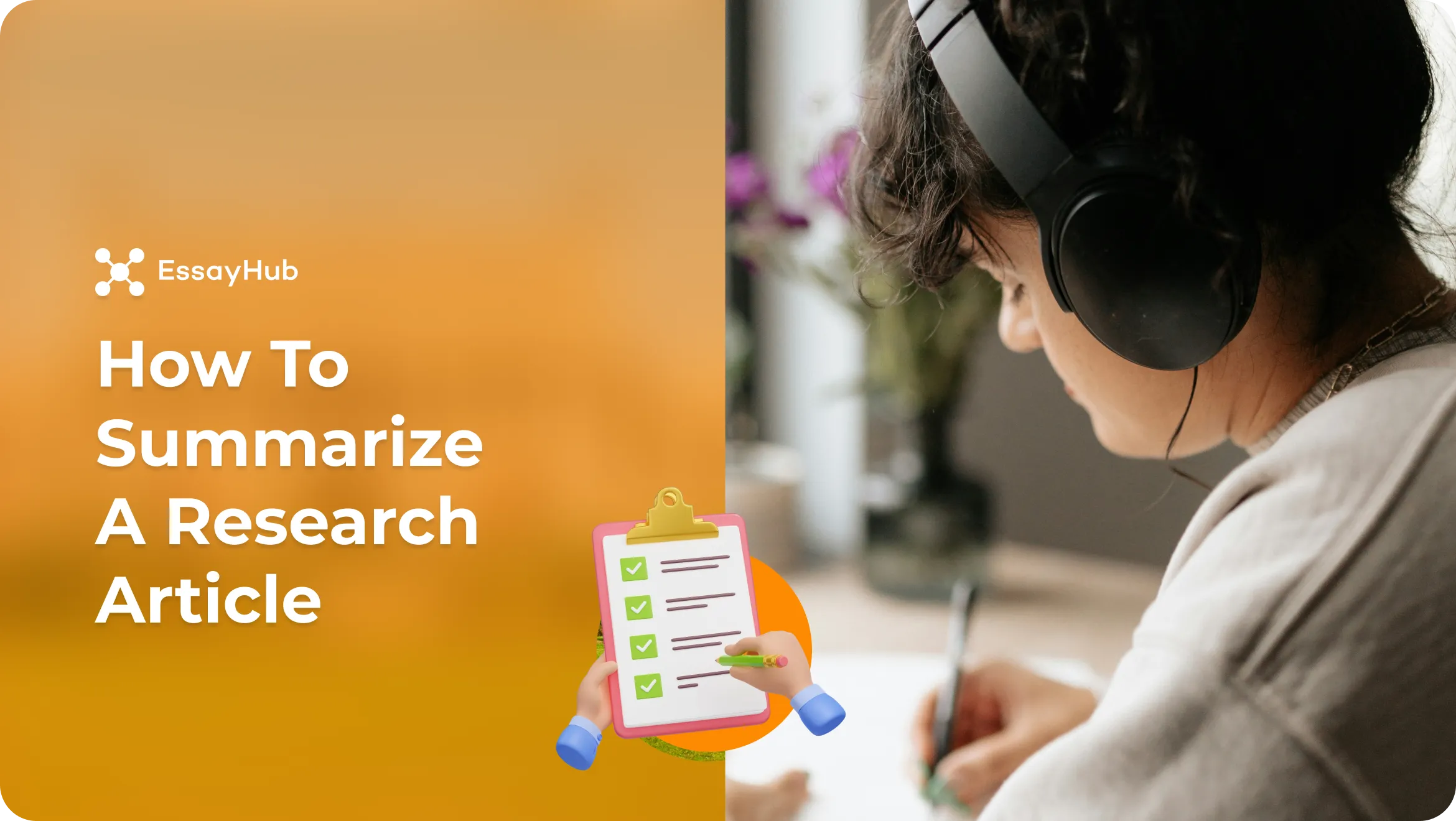In academic writing, the beginning of your research paper is like the opening scene of a movie – it sets the stage and grabs your audience's attention. That's where the hook comes in. Just like a catchy tune hooks listeners, a well-crafted introduction hooks the audience into your paper. It could be a surprising fact, a thought-provoking question, or a cogent story. In this article, we'll explore how to create that perfect hook for your research paper, helping you engage your readers right from the start. Before we start, please consider the option of telling our writers, ‘write my research paper for me,’ so they can cover up for you in case the deadlines are short.
What is a Good Hook for a Research Paper?
A good hook for a research paper is like the opening scene of a movie that grabs your attention and makes you want to see more. It's a memorable or intriguing statement at the beginning of your paper that draws readers in and makes them interested in what you have to say. This could be a surprising fact, an interesting story, a thought-provoking question, or anything else that grabs people's interest. The goal is to make your audience curious and eager to keep reading to find out more about your research essay topics.
Types of Hooks for Research Papers
When it comes to hooks for research papers, there's a diverse toolbox at your disposal to grab your audience's attention right from the start. One common type is the anecdotal hook, where you share a brief, relevant story that connects to your topic. Anecdotes humanize your writing and make abstract concepts more relatable to your audience. Another effective hook is the question, posing a thought-provoking inquiry that prompts readers to ponder the subject matter further. Questions can stimulate curiosity and encourage readers to interact with your research. Similarly, starting with a surprising statistic or fact can jolt people out of complacency and spark interest in your paper's content. Statistics provide concrete evidence and highlight the significance of your research topic, gripping readers to learn more.
Moreover, quotes from relevant sources can serve as powerful hooks, offering insight or perspective from experts in the field. Whether it's a renowned scholar, a historical figure, or a contemporary authority, a well-chosen quote can add credibility and intrigue to your introduction. Finally, employing a descriptive hook can paint a vivid picture in your audience's mind, setting the scene and drawing them into your research world. Descriptive language evokes emotions and senses, creating an irresistible atmosphere that captivates your audience. By utilizing good hooks for research papers, you can effectively engage your readers and lay the groundwork for a riveting research paper.

Anecdotal Hook
Anecdotal hooks start your research paper with a short, engaging story or personal experience related to your topic. By sharing a narrative, you humanize the subject matter, making it more relatable and accessible to your readers. Anecdotes can draw the audience in emotionally, creating a connection that encourages them to invest further in your paper. Whether it's a real-life example, a hypothetical scenario, or a historical anecdote, this type of hook sets a tone of authenticity and relevance, laying the groundwork for a compelling exploration of your research topic.
- Start with a personal experience.
- Keep the anecdote relevant to your topic.
- Keep it brief and to the point.
- Make sure the anecdote sets the tone for your paper.
- Use vivid language to paint a picture.
Question Hook
Question hooks pose thought-provoking inquiries at the beginning of your research paper, stimulating curiosity and inviting other students to reflect on the topic. By starting with a question, you prompt lecturers to engage actively with the subject matter, sparking their interest and encouraging them to seek answers within your paper. Questions can range from simple queries to more complex philosophical ponderings, depending on the nature of your research. Regardless of the complexity, a well-crafted question hook prompts readers to consider the significance and implications of your research, setting the stage for a captivating exploration of the topic. If crafting such hooks seems daunting, consider leveraging write my essay services, which can help you develop effective introductions and comprehensive papers.
- Pose a thought-provoking question.
- Make sure the question is relevant to your research.
- Consider asking a question that challenges assumptions.
- Keep the question concise and clear.
- Avoid questions with simple yes or no answers.
Surprising Statistic or Fact Hook
Surprising statistics or fact hooks kick off your research paper with a compelling data point or piece of information that grabs readers' attention. By presenting a surprising statistic or fact, you immediately capture the interest and emphasize the significance of your research topic. Statistics provide concrete evidence and highlight the relevance of your paper's subject matter, compelling the audience to delve deeper into the content to understand its implications. Whether it's a startling figure, a little-known fact, or a counterintuitive finding, this hook establishes credibility and intrigue, laying a strong foundation for your research paper.
- Find a statistic or fact that is relevant to your topic.
- Make sure the statistic or fact is reliable and from a credible source.
- Choose something that will surprise or intrigue your readers.
- Provide context for the statistic or fact.
- Use the statistics or facts to highlight the importance of your research.
Quote Hook
Quote hooks introduce your research paper with a relevant and compelling quotation from a respected source. By incorporating the words of experts, scholars, or notable figures in the field, you add credibility and authority to your introduction. Quotes can offer insight, perspective, or a compelling argument that sets the stage for your research. Whether it's a timeless aphorism, a memorable line from literature, or a profound statement from a prominent thinker, a well-chosen quote hook captures readers' attention and encourages them to consider the ideas presented in your paper.
- Select a quote that is relevant to your topic.
- Ensure the quote is from a reputable source.
- Provide context for the quote.
- Make sure the quote is impactful and memorable.
- Integrate the quote seamlessly into your introduction.
Descriptive Hook
Descriptive hooks paint a vivid picture at the beginning of your research paper, using rich language to set the scene and draw readers into the world of your topic. By appealing to the senses and emotions, descriptive hooks create an immersive experience that captivates the professors' imagination. Whether it's a detailed description of a place, an evocative portrayal of a character, or a vivid depiction of an event, this type of hook engages readers on a visceral level, making them feel as though they are part of the story. Descriptive hooks establish a strong sense of atmosphere and mood, laying the groundwork for a compelling exploration of your research topic.
- Use descriptive language to set the scene.
- Appeal to the senses with vivid imagery.
- Make sure the description is relevant to your topic.
- Create an emotional connection with your readers.
- Keep the description concise and focused.
Rhetorical Question Hook
Rhetorical question hooks engage readers by posing a question that does not require an answer but encourages reflection and contemplation. By starting with a rhetorical question, you prompt reviewers to consider your research topic's broader implications and complexities. Rhetorical questions can challenge assumptions, provoke thought, and encourage critical thinking, creating a nuanced exploration of your paper's subject matter. Whether it's a philosophical inquiry, a moral dilemma, or a speculative query, this type of hook invites readers to participate in the conversation actively, laying the groundwork for a thought-provoking discussion.
- Pose a question that encourages reflection.
- Consider asking a question that challenges assumptions.
- Ensure the question is relevant to your research.
- Make sure the question is thought-provoking.
- Use rhetorical questions strategically to engage your readers.
Research Paper Hook Examples
Research paper hook examples can be helpful for students because they show different ways to grab readers' attention right from the start. By looking at examples like anecdotes, questions, surprising facts, quotes, descriptive openings, and rhetorical questions, students can learn practical techniques to make their papers more interesting. These examples act as guides that students can follow to improve their own writing, making their research papers more engaging and effective. Additionally, if you need more support, an assignment writer can help guide you and improve your approach to creating strong introductions.
- Anecdotal Hook
"As a child, I used to gaze up at the night sky, mesmerized by the countless stars shimmering above. Little did I know then that this childhood fascination would blossom into a lifelong passion for astronomy, driving me to explore the mysteries of the cosmos through rigorous scientific inquiry."
- Question Hook
"What if I told you that every decision you make is influenced by subconscious biases that you're not even aware of? From choosing what to eat for breakfast to making major life choices, the human mind is a complex web of cognitive processes. But how does this affect our behavior in society, and what implications does it have for understanding human nature?"
- Surprising Statistic or Fact Hook
"Did you know that over 8 million tons of plastic waste enter our oceans every year? This staggering statistic not only highlights the severity of the global plastic pollution crisis but also underscores the urgent need for innovative solutions to protect marine ecosystems and preserve biodiversity for future generations."

.png)




